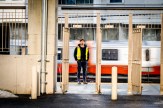Will Space Command help or hurt international relations in space?

The United States recently established Space Command, a military headquarters for space operations that President Donald Trump described as a way to “ensure that America’s dominance in space is never questioned and never threatened.”
But, says Mai’a Cross, a professor of political science and international affairs at Northeastern University, sending the military into space could create conflict where there previously hadn’t been one.

Mai’a Cross, a professor of political science and international affairs at Northeastern, says that sending the military into space could create conflict where there previously hadn’t been one. Photo by Adam Glanzman/Northeastern University
“It’s important to remember that there are not any weapons in space,” says Cross, who has been invited to speak at international conferences on space exploration, and recently published a policy brief on the future of space exploration in the Norwegian Institute of International Affairs.
Trump’s plan is backed by many, including former military officials who see the creation of the Space Command and eventually a new branch of the military called “Space Force” as ways to deter conflicts on Earth from escalating into space.
There are more than 2,000 satellites orbiting the Earth, almost half of which were launched by the U.S. and have become central to everyday life. The military depends upon some for gathering intelligence and guiding missiles, while others enable the nearly ubiquitous cell phone communication that’s become a hallmark of the modern age.
Other countries, including Russia, China, and India, have for years been developing ways to destroy or disable satellites from Earth. In the past decade, both China and India have carried out high-profile tests of such capabilities by targeting their own satellites.
Cross argues that the idea of fighting a war in space “is a bit far-fetched,” for one very big practical reason: Blowing up enemy satellites creates an immense amount of free-floating space debris that could collide with a country’s own satellites, destroying them in the process—a concern she shares with the United States’ top military officer responsible for defending space.
“The practical reality is that if you mega-size the space debris problem, you cannot control where all those pieces of metal go in low-Earth orbit,” she says. “If you try to destroy something in space through military action, you’re potentially destroying all satellites in orbit.”
Both the Chinese and Indian anti-satellite tests created huge amounts of space debris that are still floating in a cloud around the Earth’s orbit.
The ratcheting-up of a military presence in space could also have the unintended consequence of becoming a “self-fulfilling prophecy,” Cross says, in which various countries, so panicked that one another are going to attack, end up creating a conflict instead of avoiding one.
“This could become a competition with various forms of sabotage,” she says.
Cross is also concerned that the militarization of outer space could hamper international collaboration that has long been the signature characteristic of scientific space exploration.
If, for example, a country’s scientific knowledge becomes “more about jealously guarding advancement in space, it might be difficult to keep up this international collaboration,” Cross says.
For media inquiries, please contact Shannon Nargi at s.nargi@northeastern.edu or 617-373-5718.





